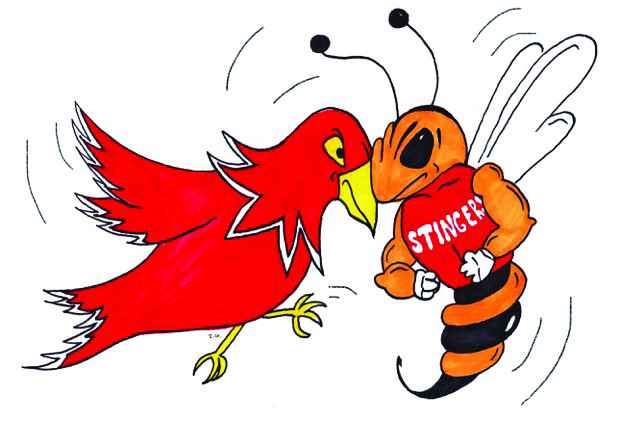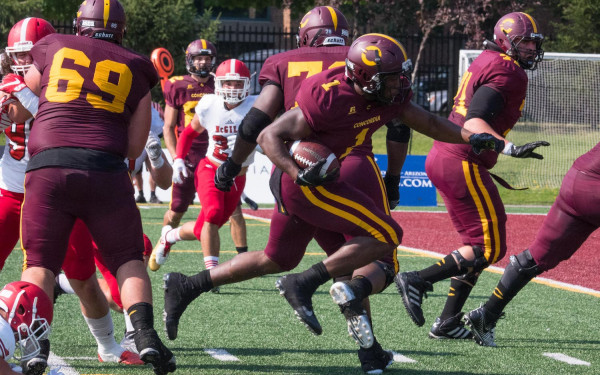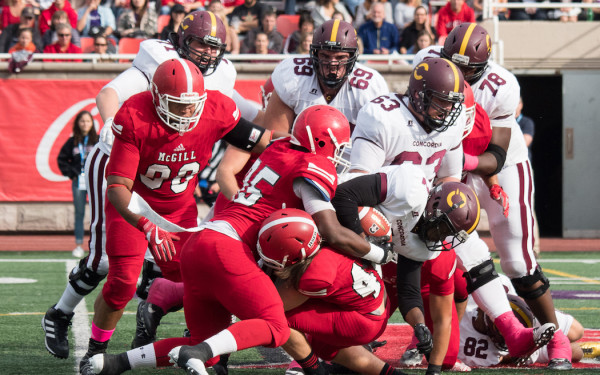Concordia and McGill Love to Hate Each Other
Students and Athletes Talk About Their School’s Rivalry
I’d rather be a Redman
than a fucking bumblebee,
I’d rather be a genius
than flip burgers at McD’s,
I’d never wipe my ass
with a Concordia degree,
So fuck you bumblebees!
Sung to the tune of “Solidarity Forever,” those are the words of McGill’s anti-Stingers fight song.
The McGill-Concordia university rivalry is weird. On the surface, it looks like any other you’d find in university sports.
Some might assume that these two schools might be rivals based on proximity, and the fact that they’re Montreal’s only two anglophone universities. But this isn’t like the old McGill-Queen’s rivalry, which was mainly rooted in their comparable academic prestige and profiles.
The disdain between athletes that is typical of most sports rivalries doesn’t exist—at least not to any significant degree. Rather, the reasons are more nuanced.
“The fact that at all games McGillians insist on yelling that song as loud as possible maintains that we have very little working for us,” said McGill student Bobbie Gaucher.
“Concordia has such a welcoming environment and cooperative faculties, whereas McGill is so focused on the status quo. It’s harming the quality of education. But still, fucking bumblebees.”
Regardless of sport, games between the Martlets/Redmen and the Stingers are usually well attended and highly anticipated.
McGill baseball’s Fan Night just so happened to fall on the same evening they played against the Stingers.
Meanwhile, Concordia’s Shoot For The Cure event—an effort to raise funds for breast cancer research—was held during a Thursday evening men’s/women’s doubleheader against McGill.
Timing here is no coincidence. People care about this rivalry.
Former McGill standout from 2010 to 2014, and current Winnipeg Blue Bombers linebacker Jesse Briggs remembers close games and big crowds whenever the cross-town rivals faced each other.
“As soon as the McGill football schedule is released every year, I immediately circle the Concordia games,” said Briggs. “I always do my best to catch those games on TV or on a webcast.”
The rivalry between the two schools isn’t as straightforward as one school hating the other. In fact, both universities, despite their differences, coexist quite nicely. The same could be said for the players—many of whom played with each other at some point before going to university.
Ron Aboud, who played in the late 80’s and is still the most prolific passer in Concordia history, grew up around several players who went to either school.
“After the games, we would see McGill players at bars. I knew and played with lots of them, it was always friendly,” said the former Concordia quarterback.
“At first, I wanted to go to McGill,” said Aboud. “Both schools wanted me, and one of the reasons I chose Concordia was that they’re always the underdog. McGill is a big name—you can’t deny that.”
This rivalry isn’t carried out by the players—they compete against each other for bragging rights, more than anything else. Rather, it lives on through the fans.
“The crowds were always full whenever we faced McGill,” said veteran Edmonton Eskimos wide receiver and former Stinger Cory Watson. “Both schools would always bring more fans for that game. But for us, we just went out and played—and usually won.”
For McGill fans, it’s an opportunity to tease Concordia for the academic disparity between the two schools. For Concordia fans, it’s a chance to embrace the role of the underdog.
Both fanbases have something to dislike about the other, and it gives them a reason to show up for those games and cheer for their team. It also doesn’t hurt that what is arguably the rivalry’s flagship game—the first of two football games between them.
The Shaughnessy Cup—named after legendary McGill football coach Frank Shaughnessy—always manages to attract large crowds. It’s always scheduled during the host school’s frosh weekend—which is no accident, either.
“The fact that they put stakes in the game made it more important for us,” said Watson. “The atmosphere was great, and it always pushed us a little harder during the Shaughnessy Cup. After the games, though, we were all friends.”
This rivalry isn’t one of hostility, unlike the now defunct Queen’s vs. McGill clash. Queen’s quite literally used to call it “Kill McGill.”
In terms of age and academic prestige, Queen’s and McGill are similar. They’re also much further away from each other, geographically. They hardly ever interact outside from their scheduled sports games, giving fans only one opportunity to let out their pent up frustrations.
“The Concordia-McGill thing is new,” said Watson. “It’s just because they’re the two English universities in Montreal. It’s a more recent rivalry and they’ve had to make their traditions from scratch.”
That’s why they sing that song. By all accounts, they’ve been singing it since the early days of this rivalry. Concordia has had over 40 years to come up with a comeback, but they still haven’t.
“It’s a shame that they haven’t made a song in response to it,” said Briggs, laughing. “McGill fans love to tease the academic side. It’s all for fun, though.”
Perhaps Concordia hasn’t come up with one because they want to push the underdog narrative.
“We know that nothing about that song is true, it’s all in the spirit of fun,” said Aboud. “But, we’d always hear from McGill fans that, someday, we’ll be working for them. That pisses you off. You want to show them that if you work hard enough, none of this matters.”
Possibly.
Either way, this new rivalry is still trying to figure itself out. It has made strides—the Concordia-McGill games will still be the most attended games, regardless of sport. But the rivalry is young—and it’s still looking to forge its own traditions.
“To be honest with you, I didn’t really know about the rivalry before I got to McGill,” said McGill student James Langshaw.
McGill and Queen’s had been playing football against each other for the better part of a century, before conference realignment put the kibosh on their annual meetings. Queen’s would bring several busses full of students the night before the game, and they’d turn the McGill Ghetto upside down.
Concordia still has a long way to go before reaching that level. But the fact that they sing that song and the Stingers like to be the underdog gives both schools a nicely defined role in this relationship—it’s a good start.







_600_375_90_s_c1.jpg)